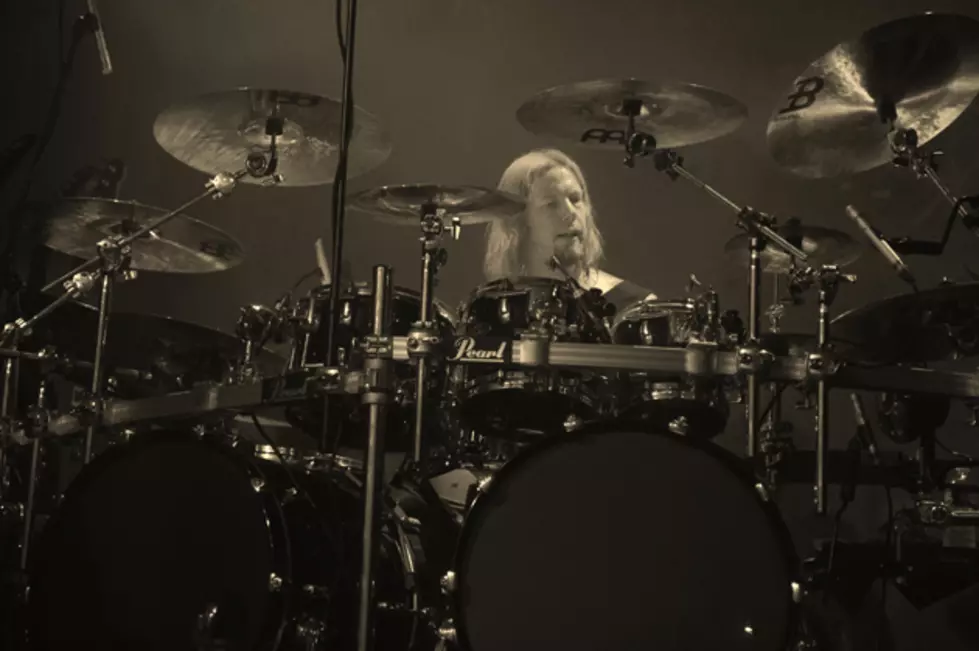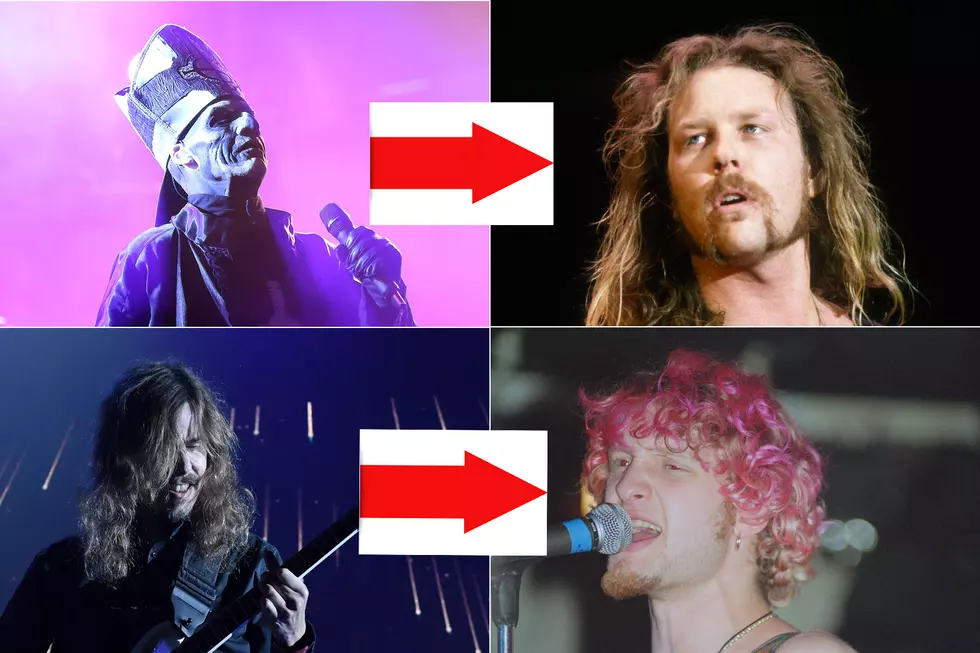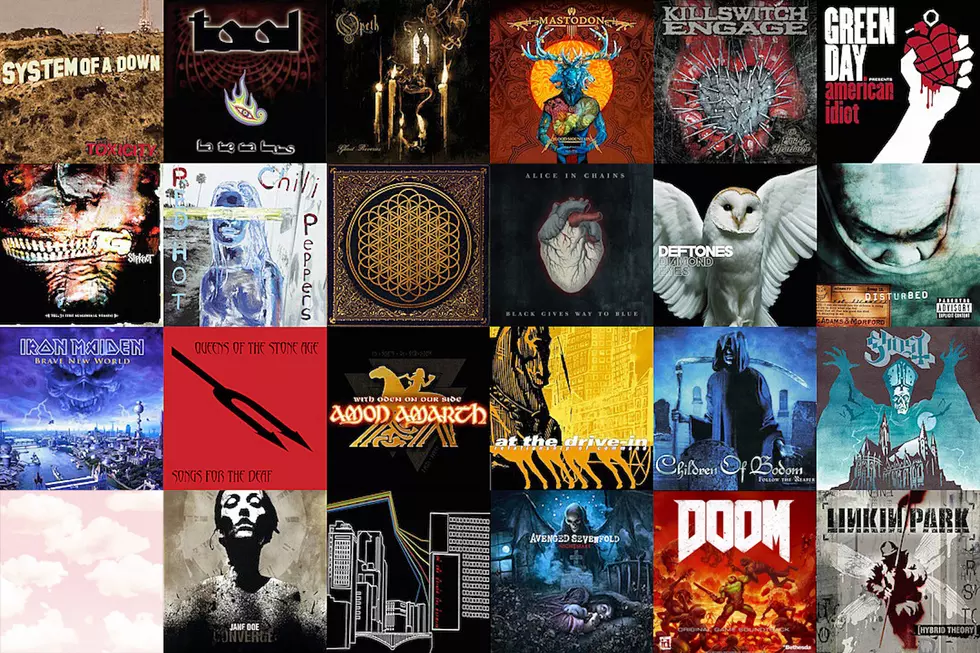
Amon Amarth Drummer Fredrik Andersson Talks ‘Deceiver of the Gods,’ Longevity + More
With over 15 years in music and nine studio albums, Swedish melodic death metal band Amon Amarth have built quite a legacy. Loudwire had the chance to chat with the band’s drummer Fredrik Andersson during their recent headlining show in New York City and he spoke about their 'Deceiver of the Gods' disc, the longevity of the band as well as his fondness of beer. Check out our interview with Fredrik Andersson of Amon Amarth below:
‘Deceiver of the Gods’ -- What does this title mean to you?
To me it means what it means -- Loki is the ‘Deceiver of the Gods’ in Nordic Mythology. It’s about Loki.
How was the overall recording process for you on this record?
It was the first time, for us, working with producer Andy Sneap. We did what we have in the past and just came into the studio and recorded songs. [Laughs] It’s not rocket science, we just do what we do.
With this being your ninth album, you guys are pretty much veterans at the whole process.
I would hope so. [Laughs] I would say, for me at least, this was one of the most smooth recordings we’ve ever done. It was very easy to work with Andy and he had a good vibe with the band. Everyone was relaxed, there was no stress, it was really good.
What about who you are as a musician and person can we hear on ‘Deceiver of the Gods’?
I have a much more relaxed and laid back attitude in general. I let go of a lot of personal pressure that I usually have going into album recording. For me as a drummer, in the past I always wrote every part 100 percent and made sure that was exactly what ended up on the album. On this album I actually winged 50 percent of the stuff and just did a couple of different takes and improvised a lot more in the studio. It made me a little bit on edge when I played but it was more relaxed, not as strict and I didn’t get pissed off every time I didn’t nail it. I think improvising makes the album a little bit more edgy and aggressive.
What is the secret to your longevity as friends and as bandmates?
We kind of hit the bump already, that three-year bump or whatever it is. We have a very good working relationship and I think the key is that we went into this never expecting to come this far. I mean we were just playing together as friends and that’s where we started off. Having no expectations when gradual success happens, we’ve just taken it on the same level all the time. Early on we decided there are no egos in the band. We share everything equally, everyone has equal say on everything. We have a democracy working, there’s no reason for anyone to argue.
Songwriting as well, even though Johan [Hegg] and Olavi [Mikkonen] write more than 90 percent of the music -- when someone else in the band has ideas, if they are good then they will be in the song. There’s no egos in that either, the best music always ends up on the record no matter who wrote it. Even on the albums we put “Written by Amon Amarth," not the person who wrote that.
You mentioned the improvisation on this album. Were there specific memorable or interesting moments or a specific song that was challenging while recording?
There is always some of that and it’s always the least expected part that you think is going to be really simple and then you get a mind block. You might get stuck at a certain part but the atmosphere in the studio, there was never any pressure so there were very few of those moments. When they did happen we would just finish the day and continue tomorrow or we would go to the pub and have a few pints and come back later and see how it works out.
While recording what did you have a few pints of?
Well we were recording in Derby in England so the local brew there is Real Ale. It’s almost like a flat beer. It’s not very strong, the average alcohol percentage is four percent.
In general what are some of your favorite beers?
I like IPAs, a lot of American brewers make really good beer. I also like Stouts, dark and heavy beers.
So many great metal bands, come from Sweden -- Opeth, In Flames, Bathory... What do you think it is about the country that produces so much great metal music?
I think we are born with music as a culture. We have a big history of melody in our music. From Folk music, which no one listens to anymore but it’s still there, it still exists. Also the fact that music is endorsed in school, when you start eighth grade you pick an instrument and you have lessons every week and that’s where many students get introduced to music.
When you were in eighth grade was your instrument of choice the drums?
[Laughs] No it wasn’t, I wanted to play guitar but almost everybody picked the guitar. I wanted to be different so I picked the piano and played piano for five years. I actually played guitar for a couple years after that as well. I picked up drums very late. Around 19, I started playing drums.
What made you decide to continue with the drums?
Well first I was in a band where I played the guitar then I started my own band and taught my best friend how to play guitar. I wrote all the songs and taught it to him. We had a drummer but he wasn’t very good. I wanted to have more control of the band so I basically wrote the songs and guitar parts and played the drums as well.
Many fans refer to Amon Amarth’s music as Viking Metal. When you first heard that term, what did you think of it?
I thought it was cool. When that genre popped up, it appeared, 10 to 15 years in our career and we couldn’t relate to it. In our world we play melodic death metal. In the mid-'90s, when we started playing, that was the genre we played. It made sense, I guess, that there would be a sub-genre. We didn’t want to be recognized with bands that played more folk music style like if you look at Finntroll or Eluveitie. We didn’t have anything to do with that so we kind of wanted to distance ourselves from that and make people aware that we play regular metal. There’s no folk singing in it. People always argue, “What is it?” It doesn’t really matter, it’s music. One fan came up to me and told me, “My friends always ask what is Amon Amarth? Is this Death Metal, is it Black Metal?” and he said, “It doesn’t matter, for me it’s metal from the heart.”
What does 2014 have in store for Amon Amarth.
A lot of touring, this is our first headlining tour in the States for this album. We need to come back and do Canada. We’re doing festivals. We’re going to South America, Australia, hopefully Asia. We need to go back to Europe again. It’s going to be busy.
With all of this touring what is one thing you must have on tour with you, no electronics.
This long being a touring musician, at the beginning I used to prepare my suitcase weeks before when we first toured. Now I pack either the evening before or the morning of the tour. I know as long as I have my passport, keys and wallet I can always manage. That’s what I need, everything else you can just get on the road.
More From Loudwire









